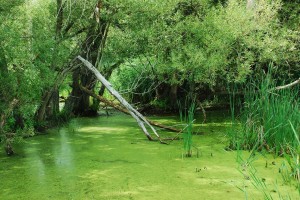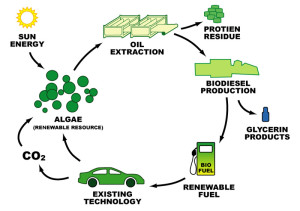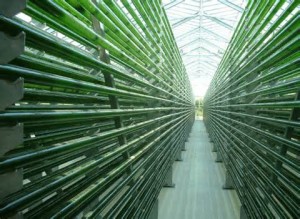Algae Biofuel – The Greenest Form of Renewable Energy?
Could Algae Biofuel literally be the greenest form of renewable energy?
At PIF we have covered topics on most of the renewable energy - Algae is a new one for us!

There's green energy. And then there's algae. Unlikely as it seems, this green sludge has emerged as one of the most promising sustainable sources of biomass and oils for fuel, food and a raft of other products. No really!
According to AllAboutAlgae.com, “Products made from algae are the natural solution to the energy, food, economic, and climate challenges facing our world today. Algae have the power to simultaneously put fuels in our vehicles, recycle CO2, provide nutrition for animals and people and create jobs for millions...”
What is algae?
Simple plants at heart, algae range from microscopic microalgae to macroalgae seaweeds. It can grow in brackish, sea, and waste water. Through photosynthesis carbon dioxide, sunlight and nutrients (like phosphorous and nitrogen) are converted into biomass, in a process known as 'autotrophic growth.' Algae can even help treat and purify industrial run-off by sponging up the available nutrients.
How is algae produced?

“Autotrophic microalgae are cultivated on land in large ponds, or in enclosed so-called photobioreactors, using enriched CO2,” say AllAboutAlgae.com. “The CO2 can come in the form of flue gases from power plants or be obtained from other fossil fuel combustion and biological processes. They thus can help recycle this specific greenhouse gas, and can help reduce greenhouse gas emissions overall when the algal biomass is converted into biofuels.”
They add, “Algae can be now converted into a variety of fuels like biodiesel, gasoline and jet fuel. Today’s algae 'reservoirs' live above ground, never need to be drilled, and never run dry.”
What are the advantages of algae
Algae grows prolifically quickly, doubling every few hours, and can be harvested daily. Plus the combined energy storage of oils and carbohydrates produces high yields of biofuels per acreage.
It also absorbs carbon dioxide, absorbs emissions from power plants, and can be cultivated on land, and in water, that's otherwise unsuitable for agriculture.
With its rich micronutrient content, microalgal biomass can be used to produce animal feeds and dietary supplements alike. It not only thrives in, but can purify, waste water like industrial effluents and animal waste. Algae can also produce useful products – like plastics, lubricants and fertilisers – and dried algal biomass can be burned to generate power. Finally, there's the job creation. The Algal Biomass Organization predicts 220,000 new jobs in this sector by 2020.
What are the disadvantages of algae?
According to The Science Museum, “The problem is, although small algae factories work well, scientists aren’t convinced they’ll ever be able to scale them up to full size. Some people argue we shouldn’t focus our attention on unproven ideas, when we could fight climate change using technologies we already have.
“What’s more, to be a realistic alternative to fossil fuels, algae biofuels will need to be affordable. The balance might change as oil becomes scarcer, or if carbon emissions are taxed, but recent estimates suggest algae biofuels will struggle to compete on price.”
Where is it happening?
The All-gas project in Southern Spain, funded by EU coffers, produced its first algae biomass crop in summer 2013 and by next year will be ramped up to an area of 10 hectares. The Institution of Mechanical Engineers (ImechE) said, “They hope to be able to produce 3,000kgof biomass a day, yielding around 2000m3 of biomethane, enough to fuel about 150 vehicles a day. This will make it the largest algae biomass production plant in the world that uses wastewater as a feedstock.”
The project’s coordinator, Frank Rogalia, is director of innovation and technology at Spanish water company FCC Aqualia. He told ImechE, “This new approach means that Spain’s 40 million population could power 200,000 vehicles every year from a single toilet flush.”
He added, “There are many efforts to develop algae biofuels, in total worth billions of euros. I have no doubt, given the magnitude of investments into research and development, successful results will ensue - but the timeframe to reach economical returns is the big unknown.”
Find out more about algae's amazing attributes in this video.
Get the latest process industry news
Interested in receiving even more industry-leading news from Process Industry Forum delivered directly to your inbox? Then sign up to our free newsletter. Bringing you the latest news, trends, innovations and opinion from across the process industry, our exclusive newsletter gives you all the industry insights of the moment in one, easy-to-digest bulletin. Stay ahead of the competition with regular process industry news instalments from PIF.
